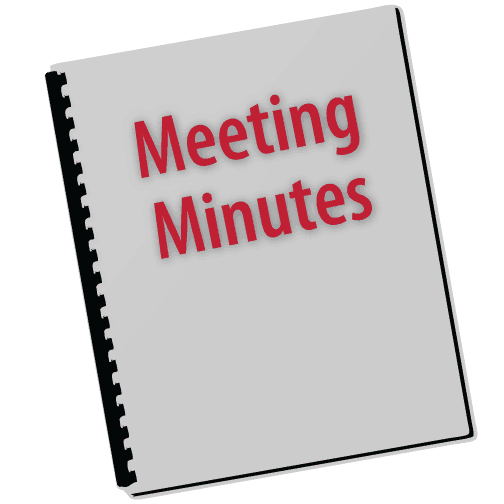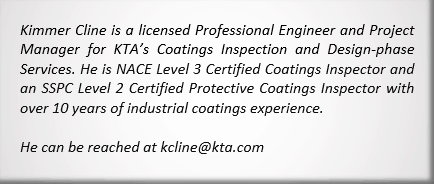The goal of any construction project that involves removal and replacement of protective coatings/linings should be to safely deliver a quality project, executed according to contract documents, on time and on budget. However, there will be many obstacles to overcome throughout the duration of any project. One of the most important steps to help overcome those obstacles is to get the project started off on the right foot by holding an effective, efficient pre-construction conference.
 The pre-construction conference, or “pre-job conference” should be scheduled and conducted prior to the actual field work beginning. The meeting has several purposes. First and foremost, it is likely going to be the first opportunity where all the key players will be together in the same room to discuss the project in detail. It is essentially a mini partnering session. Every aspect of the project should be evaluated and discussed to minimize issues later during construction. There are some items of work that will most likely be started or even completed prior to the pre-construction conference, which include: submittal review, obtaining permits, utility and/or railroad notifications, etc.
The pre-construction conference, or “pre-job conference” should be scheduled and conducted prior to the actual field work beginning. The meeting has several purposes. First and foremost, it is likely going to be the first opportunity where all the key players will be together in the same room to discuss the project in detail. It is essentially a mini partnering session. Every aspect of the project should be evaluated and discussed to minimize issues later during construction. There are some items of work that will most likely be started or even completed prior to the pre-construction conference, which include: submittal review, obtaining permits, utility and/or railroad notifications, etc.
 Meeting minutes should be recorded for reference, and the outcomes may become addendums to the project specification. The individual responsible for recording the meeting minutes should be determined prior to the start of the meeting so that they are prepared to do so, and already know how to record accurate minutes. A sign-in sheet should be circulated to all attendees that will be distributed with the meeting minutes. The sign-in sheet should contain contact information for each attendee as well (cell phone no., email address, etc.).
Meeting minutes should be recorded for reference, and the outcomes may become addendums to the project specification. The individual responsible for recording the meeting minutes should be determined prior to the start of the meeting so that they are prepared to do so, and already know how to record accurate minutes. A sign-in sheet should be circulated to all attendees that will be distributed with the meeting minutes. The sign-in sheet should contain contact information for each attendee as well (cell phone no., email address, etc.).
For the pre-construction conference to be effective, an agenda should be prepared and list the topics to be discussed, as well as who will lead the discussion. For example, if the agenda includes a discussion of the coating materials, then the coating manufacturer’s representative should be prepared to lead that discussion. The agenda should be distributed to the invited meeting attendees one to two weeks prior to the scheduled date of the meeting. This will give them plenty of time to prepare to discuss the topics you’ve outlined, as appropriate. They may also want to add topics to the agenda, which, in turn, you will need to time to prepare for.
Every project is unique and will have a variety of topics that will need to be discussed at the pre-job conference. Below is a list of basic items (along with descriptions) that you can expect to find on a pre-construction conference meeting agenda:
- Introductions – Always start the meeting with introductions. Each attendee, at the very least, should state their name, company and position/title.
- Project Overview – You should have information regarding the project at the top of the agenda. Information such as, project title and/or number, project location, contractor, consultant and owner should be listed.
- Project Personnel – List all the key players from the contractor, consultant, owner, sub-consultants, etc. You should also have corresponding telephone numbers for each name. There may be key personnel on the project that do not get invited to the pre-construction conference, but may be essential in the field and the individual that you or your team members are relying on the most. A chain of command can also be prepared so it is clear to all team members who reports to whom.
- Schedule/Duration/Sequencing – The schedule can often be the most sensitive topic of the whole project. The contractor knows how important adhering to the approved schedule is, but they may need to be reminded of the monetary consequences of not finishing on/before the stop date. You may also stress the importance of submitting timely revisions of the schedule as needed. The owner is counting on the project to be completed by a certain date as agreed upon by all parties. In addition, if the project involves bridge and highway work and the work will be performed at night, the start and stop time of the lane closures should be reviewed.
- Submittal Status – The submittals may all be reviewed and accepted by the time the pre-construction meeting takes place. If so, the highlights of the submittals should be reviewed. If the submittals are still in the process of development and/or review, the pre-construction conference is a good opportunity to discuss any issues associated with the submittals when they will be approved, or whether there are any issues that may be delaying the approvals.
- Equal Employment Opportunity, DBE Participation, Labor Standards – It is likely that a federally funded project will have requirements for EEO and/or DBE participation. You will need to be familiar with the requirements of the contract and be prepared to discuss them with the contractor.
- Safety – Most construction projects will have some element of safety hazards associated with them. The contractor has certain responsibilities to minimize/eliminate the hazards that the workers and public may be exposed to. As the owner’s representative, you will need a broad understanding of what these hazards are. Make sure the contractor is knowledgeable of the hazards and is prepared to provide a safe working environment for project personnel. This is a good time to discuss who the safety professional and/or competent person is, if required at the site. Discuss what level of interaction (daily or weekly safety meetings) this person will have with the workers, as well as their level of authority.
- Materials – Discuss the different construction materials (e.g., abrasives, coatings, thinners, caulks, etc.) that will be delivered to the site. It is likely that the materials will be delivered with a certificate of compliance to the contract documents. Identify the project personnel who will be responsible for accepting the materials, reviewing the certificate of compliance and filing the documentation. There are serious consequences if the incorrect materials are accepted and installed by the contractor.
- Specifications/ Standards/ Special Provisions/ Plans – The contract will most likely have standards /specifications, plans and special provisions that the contractor must adhere to. Some contracts will have very limited standards and specifications. However, some complex projects may have hundreds of pages of standards, along with hundreds of pages of special provisions and plan/drawings. Obviously, you cannot review all these documents, so make sure you are familiar with them. As the meeting facilitator, you do not want to be the least informed person in the room.
- Project Notes – By now, you have discussed most of the important project items that need addressed. Now is a good time to present any additional items that you think are important. The other meeting attendees may present questions that arose during the earlier discussions. Project control meeting (progress meetings) frequency can be discussed and agreed upon during this time.
The person taking minutes should distribute them to the attendees within a few days of the meeting, and each person should acknowledge receipt. Each attendee should be encouraged to review the minutes and either agree that they are accurate, or file a notice regarding any of the topics they feel were not recorded correctly. Typically, there will be a note in the minutes that if the contents are not disputed within a certain number of days, then they will be considered accepted by all attendees.




This is an excellent article about an extremely critical element in any project. Thank you for sharing your knowledge!